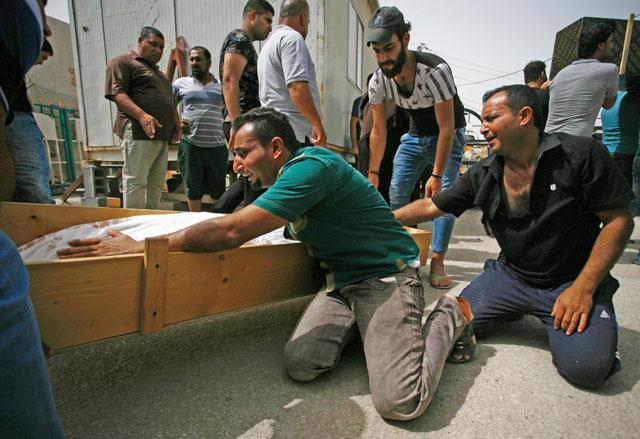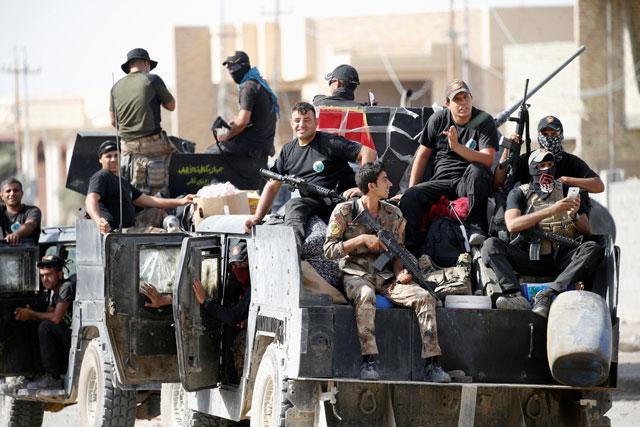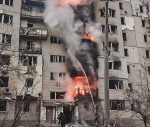You are here
Iraqi fighters break their Ramadan fast on the Daesh frontline
By AP - Jun 10,2016 - Last updated at Jun 10,2016
CAMP TARIQ, Iraq — Just before sunset at Camp Tariq — the base of operations for the fight to retake the Daesh terror group-held city of Fallujah — Iraqi officers in neatly pressed fatigues and fighters still dusty from the front prepared to break their Ramadan fast.
At a cluster of compounds housing the disparate anti-Daesh groups, meals in Styrofoam packaging were handed out to the rank and file at sunset, while generals, majors and colonels gathered around tables in mess halls.
The operation to liberate Fallujah, about 65km west of Baghdad, was announced May 22 and is continuing into Ramadan.
The fight has already proven a difficult task — as Fallujah has been under Daesh control for longer than any other town or city in Iraq — and now both sides say the Muslim holy month gives their cause greater significance.
At a tented camp housing the overflow troops brought in for the massive operation, a group of tribal fighters from the western Anbar province, where Fallujah is located, put down carpets and thin mattresses beside their armoured vehicles to lay out their evening meal, known as iftar, that breaks their dawn-to-dusk fast.
During Ramadan, observant Muslims refrain from eating or drinking during daylight hours, though soldiers, the elderly, the sick and people travelling great distances for example are exempt, according to Islamic teachings.
Iraq's most influential Shiite cleric emphasised that recently, saying fighters do not need to fast if they believe it will compromise their abilities on the battlefield.
Regardless, many Iraqi troops say they do so — despite the harsh conditions and the summer heat.
Magdi Ashour, an adviser to Shawki Allam, Egypt’s grand mufti or chief Muslim theologian, said only those fighting to protect their country and doing so under the banner of the state are entitled to break the fast at the time of war.
“But those who engage in acts of terror, bloodshed, destabilisation and undermining the peace could not use that right,” he said.
“This is our third Ramadan in this war,” said Iraqi Col. Jamal Salih Latif with the Anbar police.
This time last year the offensive to retake all of the vast desert Anbar province from Daesh had only just been announced. After months of delay, Iraqi forces began to make substantial progress in December, when Daesh was pushed out of neighbourhoods west of the city of Ramadi, the provincial capital.
Latif said that each year, the fight against Daesh takes on greater meaning during the holy month, when almost all of his men intend to fast unless they get sick.
Many of Iraq’s more traditional fighting forces, who are bound by a religious or tribal identity — such as the local Anbar police or the largely Shiite militia groups — said they planned to keep the fast for the entire month.
Among Iraq’s elite counterterrorism forces, fighters on the front-lines said that few fast because of the intensity of the operation they are carrying out.
At the sprawling military base once called Camp Fallujah by American forces, a mosque sounded the call to prayer and the Anbar policemen passed around dates, syrupy sweet juice and soup.
Over the meal they swapped theories about how Daesh is supported by regional superpowers, and why this made the group so difficult for Iraqi forces to beat.
One unit of counterterrorism troops in a nearby operations centre were eating rice and beans out of foam dishes on the floor of the small room they are bunking in.
The men peeled off their dusty fatigues and placed their weapons on the empty bunks before sitting down to the meal.
Only a handful of men were fasting that day, but the whole group still gathered for their iftar meal. As they ate, they discussed the latest rumour: that Daesh has positioned two female snipers in Fallujah.
“Their names are Hiba and Haja,” one man explained between bites, “we killed one of them and the other is pregnant”. The rest of the room nodded in solemn agreement.
In the compound next door, senior officers with the Popular Mobilisation Forces, which consists of mostly Shiite militia, broke their fast with grilled fish and rice at a large communal table.
Latif, the Anbar police colonel, said that his men are happy to fast while they fight. “It adds to our glory,” he said, but one discreetly disagreed.
“Honestly it’s just very hard,” he said quietly from the far side of the iftar spread. “And with this summer weather in Iraq, yes, it makes the operation more difficult,” he said, speaking on condition of anonymity as his superior officer had not authorised him to speak to journalists.
Across the front lines, Daesh also appears to be using the fasting month to boost morale. “This is the best month to die, brothers,” Daesh broadcast by radio to their fighters the day before Ramadan began.
But not all Daesh militants are fasting. Coalition reconnaissance drones showed lunch trucks ferrying food between fighting positions inside Fallujah just two days into the fasting month.
In the parking lot with the Anbar policemen there was a long pause when the men were asked if they expected to also observe next year's Ramadan in a state of war.
The more junior men looked to their superior officer.
"No, we won't. God willing," Latif said.
Related Articles
BAGHDAD — A suicide car bombing claimed by the Daesh terror group ripped through a busy Baghdad shopping district Sunday, killing at least 1
FALLUJAH, Iraq — Iraqi forces took the Daesh terror group’s last position in the city of Fallujah Sunday, establishing full control over one
BAGHDAD — A Daesh militant blew up an explosive-laden bulldozer near Haditha, killing seven Iraqi soldiers in one of a wave of bomb attacks


















